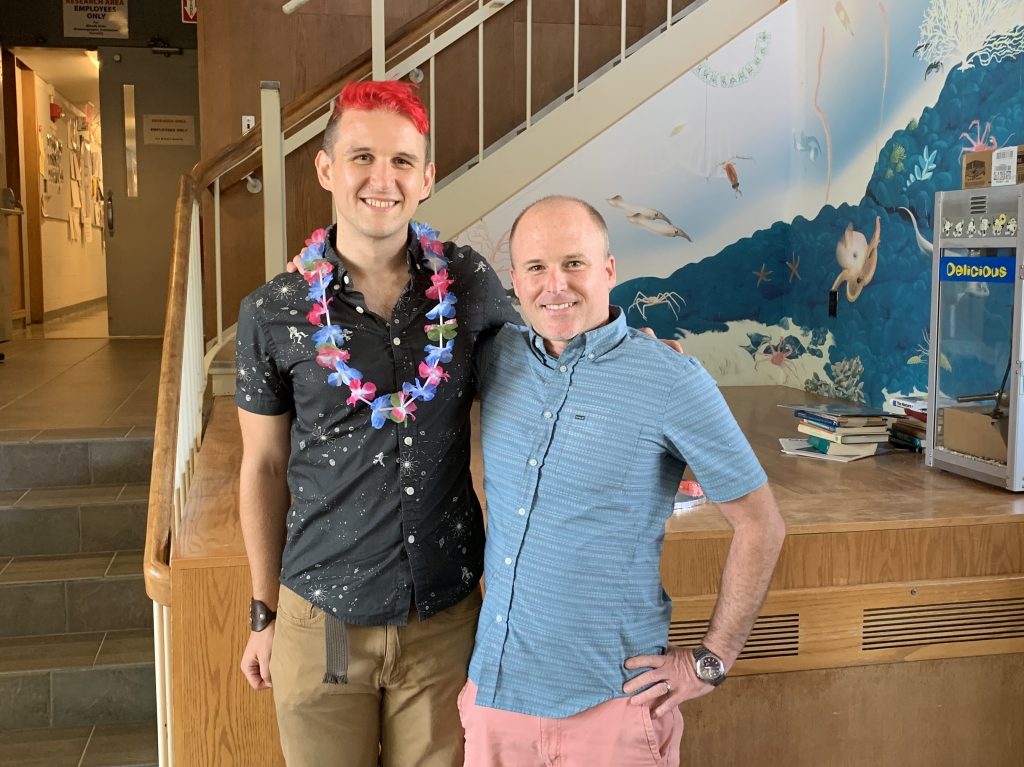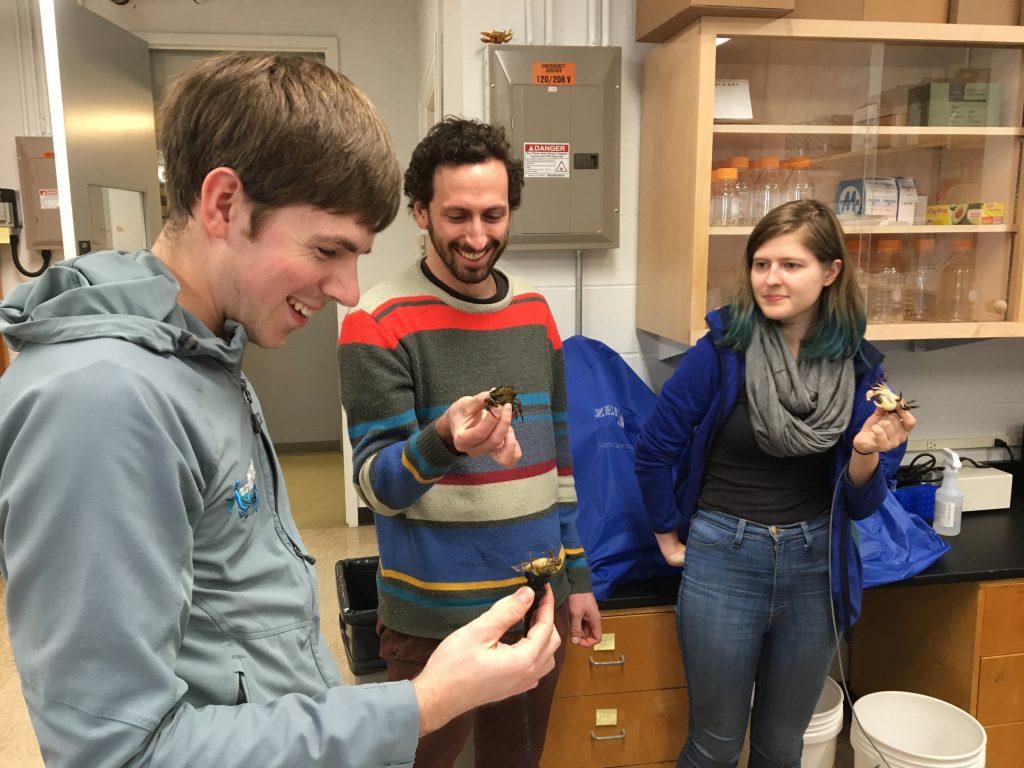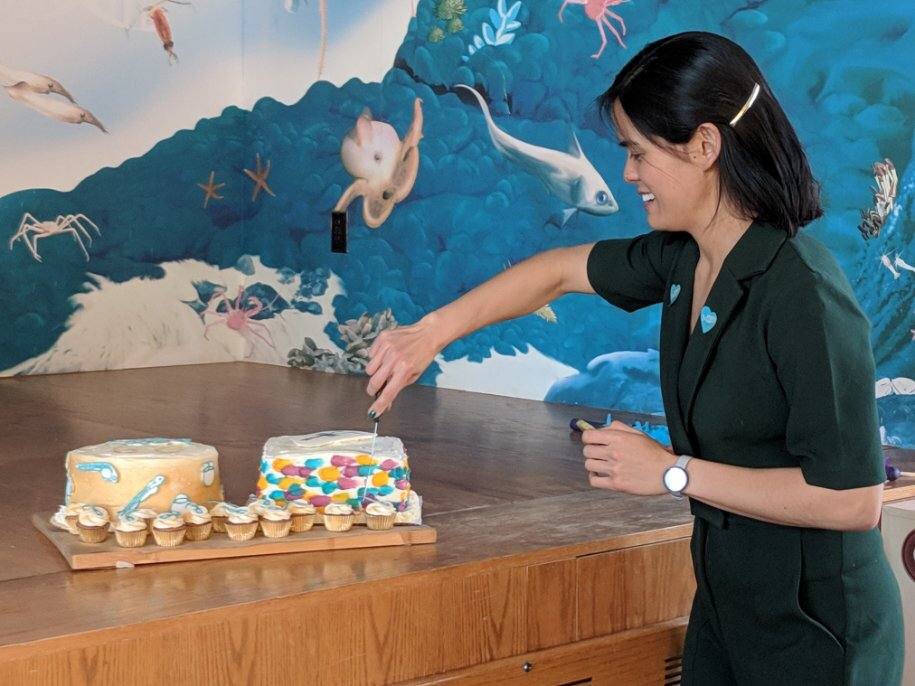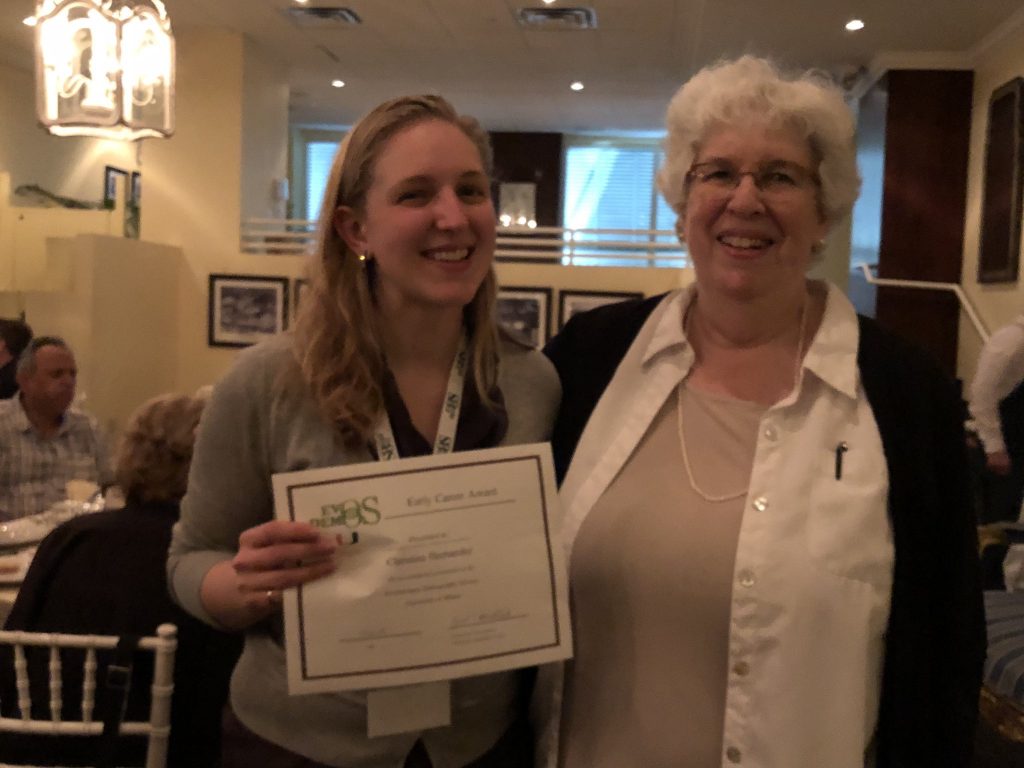Welcome!
This blog provides an opportunity for the WHOI community to get to know our students a little better, a forum to share information with the students, and a window into the JPBO for the outside world. The primary focus is on the MIT-WHOI Joint Program in Biological Oceanography. Please send suggestions for blog content to atarrant (at) whoi (dot) edu.
Six students are entering the JPBO in Summer and Fall 2019. Most of them spent their summers in Woods Hole conducting research and will be taking classes up in Cambridge this fall. This year’s talented class will be engaging in diverse fields of research that we look forward to hearing more about over the next five years. In the meantime, here are some tidbits about each of them.
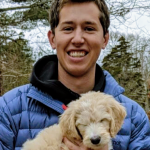 Seth Cones graduated from Ohio University with a B.S. in Marine & Freshwater Biology and a certificate in Geographic Information Systems. His undergraduate research focused on the microhabitat preferences of timber rattlesnakes. Seth is joining Dr. Aran Mooney’s Sensory Ecology lab to investigate the environmental drivers of squid habitat use and behavior, with an emphasis on how squid energetics vary under different temperature, oxygen, and salinity regimes. Outside of the lab, you could run into Seth at WHOI’s soccer and softball leagues or along the bike path walking his favorite resident pups. | 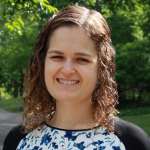 Arinanna Krinos graduated from Virginia Tech in May 2019 with degrees in Biological Sciences, Computer Science, and Computational Modeling and Data Analytics, with a minor in Mathematics. She spent her undergraduate years researching everything from lobster physiology, to atmospheric carbon dioxide modeling, to molecular biology and bioinformatics for disease ecology, to lake ecological modeling of phytoplankton blooms. While in college, she was also Editor-in-Chief of a student-run engineering magazine, Engineers' Forum, and spent a lot of time on science/environmental outreach. Outside of her work in the lab and at school, Arianna enjoys scrapbooking, kayaking, cooking, and swimming. Arianna is working with Harriet Alexander and Mick Follows in the Joint Program, with the goal of integrating bioinformatics and modeling techniques for understanding marine phytoplankton. With the help of the Computational Science Graduate Fellowship (CSGF) from the US DOE, Arianna plans to make use of high performance computing and model/algorithm development as much as possible to tackle the questions she is interested in. |
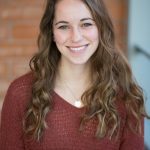 Alexandra (Lexi) Jones graduated from Temple University with a B.A. in Mathematics and Minors in Physics and Business, where she worked in an evolutionary genomics lab studying Drosophila evolution. She entered the oceanography world after working on two projects with NASA using satellite remote sensing to study phytoplankton and temperature changes in the California Current System. Lexi is currently a student in the Follows lab at MIT and in collaboration with the Sosik lab at WHOI studying phytoplankton ecology and productivity. In her free time she enjoys being outdoors, advocating for sustainability, playing board games, and creating art. | 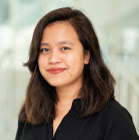 Miraflor Santos graduated with a B.S. in biology from NYU Abu Dhabi in the United Arab Emirates. As an undergrad, she studied the genetic diversity of phytoplankton and bacteria along the Abu Dhabi coast with Shady Amin. She previously worked in Matt Long’s lab looking at the ebullition of bubbles from seagrass meadows and in Heidi Sosik’s lab as a PEP student and returned to Woods Hole as a summer student fellow to study the diversity of plankton on the Northeast U.S. Shelf. She will be returning to the Sosik lab as a PhD student. Mira enjoys paddle boarding, hiking and cooking. |
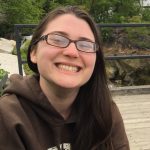 Jane Weinstock graduated from Smith College in MA with a B.A. in Geoscience and a minor in Biology. During this time, she developed a particular interest in invertebrate larval dispersal and settlement, and she has since worked on projects exploring these processes in both the Gulf of Maine and the Caribbean coast of Panama. Now a member of the Pineda Lab, she is focusing on the physical and environmental factors that affect larval supply (particularly of barnacles). Outside the lab, she enjoys baking, reading, cartoons & comics, and latin music & dance. | 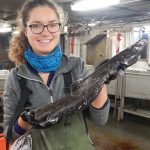 Ciara Willis received her BSc.H. from Dalhousie University in Marine Biology (Co-op) with minors in Statistics and Ocean Sciences. She has previously worked in larval ecology, fisheries economics, and microbial ecology. She is now a member of Simon Thorrold’s Fish Ecology lab at WHOI where she studies twilight zone food webs and their application to fisheries management. Outside of the lab, she loves to read, hike, and travel with her husband, Matt. |
Congratulations to Dr. Casey Zakroff, who successfully defended his Ph.D. thesis, “Physiological and behavioral responses, and their variability, in squid, Doryteuthis pealeii, embryos and paralarvae reared under chronic ocean acidification” on July 16. Casey was advised by Aran Mooney.
In his public defense, Casey shared the results from many, many experiments conducted over four years. A particular strength of this body of work was the multi-annual nature of the study, which revealed interannual variation in the sensitivity of squid paralarvae to acidification. Another very interesting finding was that elevated temperatures, which were stressful on their own, appeared to mitigate effects of acidification during development. Casey hypothesized that the reduced impact of acidification under warming is due to the faster development time, which reduced the actual time spent in acidified conditions.
A job very well done!
Cory Berger (left), Zac Tobias (center) and Jordan Pitt (right) hold locally collected crabs. If you look closely, two of the crabs are attached to cables that enable monitoring of their heart rates. This was part of a lab activity during the Marine Adaptations topics course. Up to three topics courses are offered in the Biological Oceanography program each semester. This semester the other two courses are Marine Bio-Optics and “A Salty Symbiosis.”
Congratulations to Dr. Jennifer Panlilio, who successfully defended her Ph.D. thesis, “Impacts of developmental exposures to the harmful algal bloom toxin domoic acid on neural development and behavior” on February 26. Jenny was jointly advised by Neel Aluru and Mark Hahn.
Jenny will remain at WHOI for a few months as a postdoctoral investigator. She plans to begin a new postdoctoral position at Harold Burgess’ lab at the National Institute of Health later this year where she will be looking at neural circuits that underlie light seeking behavior in fish.
A job very well done!
Seven students entered the JPBO in Fall 2018. As the Spring semester gets underway, most of them are commuting between Woods Hole and MIT a couple of times per week. In addition to being talented scientist, they are an interesting and diverse group!
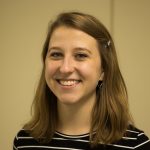 Cynthia Becker graduated from Ithaca College in upstate NY, where she received a B.S. in Biology and a B.A. in Music. While there, she worked in a genetics lab studying the nematode, C. elegans. During senior year, she studied at WHOI as a participant in the undergraduate Semester at WHOI program where she got her first taste of the exciting world of microbiology. Cynthia now works in the Apprill Lab studying the dynamics of coral reef seawater microbiomes. In her spare time, she loves playing bassoon in the community orchestra, running outside, and visiting National Parks with her twin sister. | 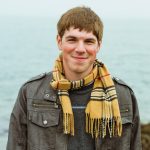 Cory Berger received his B.A. in Integrative Biology from the University of California, Berkeley, where he worked on silk gene expression in spiders. He is now a member of the Tarrant lab, where he studies genomics and molecular physiology of marine invertebrates. Outside of science, Cory loves playing and listening to music, playing chess, and staying active with skiing and hiking. |
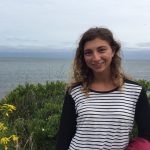 Bethany Fowler is advised by Mike Neubert and Heidi Sosik. | 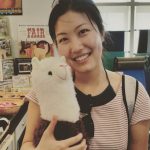 Ruijiao Sun is advised by Stephanie Jenouvier. |
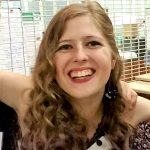 Jordan Pitt graduated from the State University of New York College of Environmental Science and Forestry with a B.S. in Environmental Chemistry and a minor in Environmental Biology. Her undergraduate work focused on the toxicity of nanoplastics to fish. She is now a member of the Aluru and Hahn lab where she studies the mechanisms by which pollutants affect vertebrates. When not in the lab, she likes to participate in dances such as swing and salsa. | 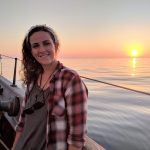 Kayla Gardner graduated from the University of South Carolina, Columbia with a B.S. in Marine Science and minors in Biology and Math. She now works in Simon Thorrold’s Fish Ecology Lab at WHOI studying the ecosystem interactions between pelagic apex predators and the twilight zone using stable isotope analysis. Outside the lab, Kayla enjoys engaging in scientific education and outreach, paddle boarding, scuba diving, and playing with her pup-Remora. |
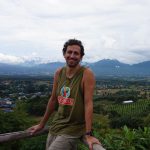 Zac Tobias completed his B.A. in Biology at Lewis & Clark College in 2012 and his M.Sc. in Zoology at the University of Otago, New Zealand in 2016. He his interested in the ecological and evolutionary dynamics of invasive species, especially within a host-parasite context. He joined the Tepolt Lab in the summer of 2018 and is developing a project to study the evolutionary consequences of population admixture in invasive tunicates. When he’s not studying or doing research, Zac enjoys surfing, fishing, hiking, and playing with his dog, Jinx. |
At the Annual Meeting of the Evolutionary Demography Society, Christina Hernández won the prize for best student presentation for her talk, “Maternal Age and Fitness in a Rotifer: a Demographic Analysis.”
The picture shows Chrissy with the president of the society, Prof. Carol Horvitz of the University of Miami.
Congratulations, and well-deserved!
Over the next few months this page will include short profiles of many of our students. I thought to start with our second year students because they are still “new faces” to many of us. Three students entered the JPBO in Fall 2017. They have a solid year of courses under their belts and are increasingly focused on research. They are busily preparing their research reports (due at the end of January) and then will move toward building their thesis committees and developing their thesis proposal. A brief introduction to each of them follows:
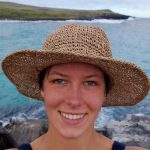 Lauren Dykman
Lauren Dykman
Lauren graduated from University of California, Santa Barbara with B.S. in Biological Sciences. There, she studied parasites in the kelp forest food web and worked in ecological restoration. She is now a member of the Mullineaux Benthic Ecology Group at WHOI where she focuses on hydrothermal vent ecology, disturbance and succession, and functional ecology. In her spare time, Lauren loves outdoor recreation including running, sailing, hiking, swimming, and scuba.
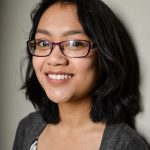
Alia Hidayat
Alia did her undergraduate work at the University of Washington, receiving a B.S. in Molecular Biology with a minor in Marine Biology. She is fascinated by the brain and currently studies the effects of algal toxins on the central nervous system in the Aluru lab. Alia is also passionate about bringing science into the community through education and communication. As part of this effort, she helps run the Broader Impacts Group at WHOI, a student group dedicated to supporting science outreach.
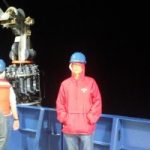 Andrew Hirzel
Andrew Hirzel
Andrew completed his undergraduate studies at the University of Miami with a double major in biology and marine science. He is studying biological-physical interactions in the McGillicuddy lab. He’s currently preparing to spend 6 weeks in the Indian Ocean looking at how plankton populations change over time within eddies. When he’s not wrangling the Video Plankton Recorder, Andrew makes excellent use of the WHOI community gardens.
- « Previous
- 1
- 2
- 3
